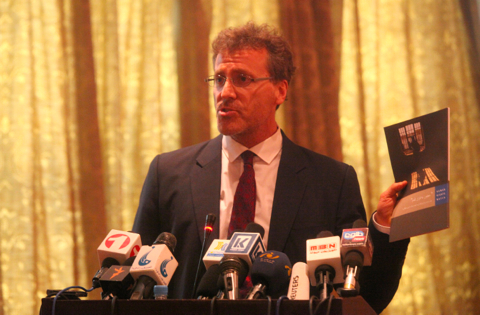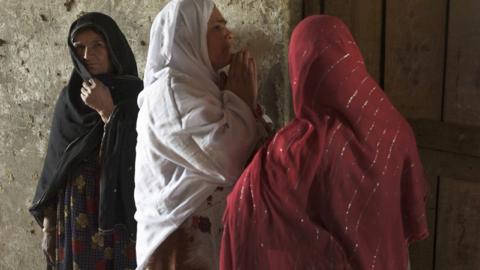KABUL - There are currently at least 600 women and girls imprisoned in Afghanistan for “moral crimes,” an increase of 50 per cent over the past 18 months, according to an international non-governmental organization (NGO) focused on human rights, which has also highlighted the need for further action from Afghan authorities on the country’s Elimination of Violence Against Women (EVAW) law.
“The situation of women and girls being imprisoned in Afghanistan for moral crimes has got much worse and the commitments by senior government officials to end such abuses have had little practical impact,” the Deputy Director of the Asia Division of Human Rights Watch (HRW), Phelim Kine, said at a news conference in the Afghan capital, Kabul, on Tuesday.
According to HRW, its investigations in 2012 indicated that there were some 400 women and girls incarcerated in Afghan prisons and juvenile detention facilities for the 'moral crime' of running away from home or having sex outside of marriage. Most of these, the NGO noted, were actually crime victims, who fled forced and underage marriage, or extreme domestic violence. Some had been convicted of sex outside of marriage after being raped.
In a news release, HWR added that women and girls charged with “moral crimes” usually flee homes to escape abuses such as underage marriage below age of 16, beatings, stabbings, burnings, rapes, forced prostitution, kidnapping and threat of “honour killing.” At the news conference, Mr. Kine noted that many abusers of women have enjoyed impunity despite the EVAW law.
The landmark EVAW law, enacted in August 2009, criminalises child marriage, forced marriage, selling and buying women for the purpose or under the pretext of marriage, ba’ad (giving away a woman or girl to settle a dispute), forced self-immolation and 17 other acts of violence against women, including rape and beating. It also specifies punishment for perpetrators.
The law was enacted by presidential decree and has yet to gain parliamentary approval. Judicial and law enforcement authorities are implementing the law but challenges persist in enforcing it. During a recent session of the Wolesi Jirga (Afghanistan’s lower house of Parliament), the EVAW law was discussed, with some parliamentarians speaking out against it.
The NGO’s announcement came in the wake of a call from the United Nations Assistance Mission in Afghanistan (UNAMA) and UN Women for Afghan authorities to step up their efforts to ensure the full implementation of the EVAW law, in line with their international commitments.
According to UNAMA, incidents of violence against women in Afghanistan still remain largely under-reported due to cultural restraints, social norms and taboos, customary practices and religious beliefs, discrimination against women that leads to a wider acceptance of violence against them, fear of social stigma and exclusion, and, at times, a threat to life. Prevailing insecurity and weak rule of law have further hampered women’s access to formal justice institutions. Those incidents that reach law enforcement and judicial authorities or receive public attention due to their egregious nature represent the tip of the iceberg of incidents of violence against women throughout the country.
“Progress in implementing the EVAW law contributes to deterring harmful practices and protecting women from violence in their daily lives,” said the Secretary-General’s Special Representative for Afghanistan and head of UNAMA, Jan Kubiš, in the joint media statement with UN Women on Monday. He added that the law is critical, not just for women and girls, but for all of Afghan society.
“I call upon the Afghan Government and Parliament to fully respect and defend the fundamental rights of women and girls by ensuring that the EVAW law is respected and implemented,” said the UN Women representative in Afghanistan, Ingibjorg Gisladottir. “It is imperative for the development of Afghanistan that women are able to exercise their rights and be free from violence in their homes and workplaces.”
In the joint media statement, UNAMA noted that the international community has firm expectations of the Government on increasing respect for women’s rights which can affect the assistance it provides to the country. HRW also called for international donors to Afghanistan to make the implementation of the EVAW law a key issue in their political engagement with the Afghan Government.
In its news release, HRW said that specialized units within the Attorney-General’s Office had made some progress in increasing enforcement of the EVAW law. In a report produced in December 2012, Still a Long Way to Go: Implementation of the Law on Elimination of Violence against Women in Afghanistan, UNAMA found that although prosecutors and courts were increasingly applying the EVAW law in a growing number of reported incidents of violence against women, the overall use of the law remained low indicating there is still a long way to go before women and girls in Afghanistan are fully protected from violence through the EVAW law.
UNAMA and UN Women – as the UN Entity for Gender Equality and the Empowerment of Women is known by – also noted in their press statement that improving “access to justice for all, in particular women, by ensuring that the Constitution and other fundamental laws are enforced expeditiously, fairly and transparently,” and ensuring “that women can fully enjoy their economic, social, civil, political and cultural rights” are key goals agreed to by the Afghan Government in the Tokyo Mutual Accountability Framework (TMAF) in July 2012 with the international community. A key indicator is the demonstrated implementation, with civil society engagement, of the EVAW Law.
Both UN bodies have called on international donors to support the Government in meeting its TMAF commitments on gender equality, women’s empowerment and the implementation of the EVAW law by developing a joint monitoring framework with specific indicators to measure progress in these areas, with development assistance based on progress made.






